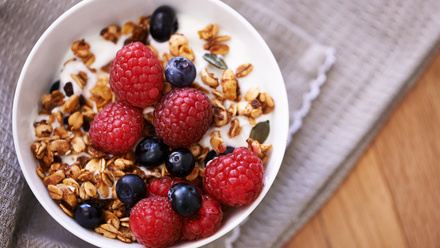Diabetes is a condition where the amount of glucose in your blood is too high. In type 2 diabetes this happens because your pancreas doesn’t produce enough of the hormone insulin (that helps glucose enter body cells to be used) and/or the insulin that is produced does not work correctly (insulin resistance).
Importance of good blood glucose control
If you have type 2 diabetes, seeking nutrition and lifestyle support is one of a number of things you could do to help you manage your blood glucose and reduce your risk of developing complications.
Structured diabetes education should be made available to you and you should be able to see a registered dietitian.
Weight management and type 2 diabetes remission
For some people with type 2 diabetes remission may be possible.
If you are living with overweight or obesity, and it is safe to do so, achieving a weight loss of approximately 15kg (33lbs), as soon as possible after diagnosis, has been shown to put type 2 diabetes into remission. This does not mean you are ‘cured’ but it may mean that you will need fewer or no medications for diabetes. Weight loss has also been shown to reduce the risks of cardiovascular heart disease.
Speak with your registered dietitian and healthcare team to discuss the options and find out if this may be suitable for you.

Glucose management
Over the years there have been many suggestions of different dietary patterns that work the best including:
- Diet focusing on the proportion of carbohydrate to fat to protein
- Low carbohydrate diet
- Mediterranean diet
- High-fibre diet
- Low GI diet
- Carbohydrate counting
Overall, it is suggested that following a Mediterranean-style diet or equivalent healthy eating pattern has the most evidence in terms of managing glucose levels and overall heart health. A Mediterranean diet would focus on:
- Reducing salt intake (less than 6g) a day
- Eating two portions of oily fish per week
- Eating more wholegrains, fruit and vegetables, fish, nuts and legumes (pulses)
- Eating less red and processed meats
- Eating less refined carbohydrates and sugar-sweetened beverages
- Replacing saturated fats with unsaturated fats and limiting intake of trans fats
- You can enjoy alcohol, but limit it to less than 14 units per week.
It may be that for personal preference, social, cultural, accessibility or economic reasons this type of diet may not be suitable for you so please speak with your registered dietitian to help you create an individualised diet.
Foods labelled suitable for people with diabetes
Foods labelled ‘suitable for people with diabetes’ have no special benefit for people with type 1 or type 2 diabetes. Non-nutritive artificial sweeteners are safe and may be recommended as part of your usual healthy, balanced dietary pattern.
Which foods affect your blood glucose level?
All carbohydrates are broken down to provide glucose. Glucose is used by our body’s cells for energy. Starchy carbohydrates include bread, rice, pasta, breakfast cereals, potatoes, yam, plantain, couscous and chapattis. Sugary carbohydrates include biscuits, sweets, chocolate, jams, and sugary drinks. Fruit (fructose) and milk (lactose) also contain natural sugars. Dried fruit and juices contain these in higher concentrations.
All types of carbohydrate will increase your blood glucose level. Many people find it useful to spread carbohydrate throughout the day and also to reduce the quantity of carbohydrate in the diet to help control blood glucose levels.
A lower carbohydrate diet could be an option for you. Speak to a healthcare professional first, preferably a dietitian, as it may not be suitable or your medication may need adjusting.
How much your blood glucose goes up or down will depend on:
- the amount and type of carbohydrate in your food and drink
- how active you are
- how much insulin your body still produces and how your body uses it
- your diabetes medication
- the amount of alcohol you drink
- emotional wellbeing
Blood glucose targets
Some people with type 2 diabetes have a blood glucose monitor to check blood glucose levels. Most people visit their GP or practice nurse who checks your HbA1c at least once a year.
HbA1c is your average blood glucose levels over the past two to three months. It is recommended people should aim for a HbA1c of 48 mmol/l or below, but this should be agreed between you and your healthcare team. If you struggle with hypoglycaemia or have other health conditions, it may be higher.
Activity
Being active is an important part of a healthy lifestyle and helps:
- control blood glucose by helping your insulin to work more effectively
- reduce cholesterol and protect against heart-related problems
- reduce and manage weight
- support your mental wellbeing
Try and do at least 150 minutes of moderate activity each week. Spread the exercise over four to five days a week, or every day. Break up long periods of not moving with some activity when possible. Try to think about how activity can fit into your life.
Top tips
- Type 2 diabetes is a condition where your blood glucose is too high due to lack of insulin and/or insulin resistance
- Insulin helps glucose enter body cells to be used for energy
- It is important to have good blood glucose control to reduce the risk of any complications
- If you are living with overweight or obesity, losing weight is the most important thing you can do
- Type 2 diabetes remission may be possible with weight loss. Speak with your dietitian to see if it will be suitable for you
- Following a Mediterranean-style diet has the most evidence in terms of managing glucose levels and overall heart health
- Foods labelled suitable for people with diabetes have no special benefit
- Aim to do at least 150 minutes of moderate activity a week
- Working with a dietitian will help you to identify any changes in lifestyle, diet and physical activity you can not only achieve but also enjoy and stick to in the long term
Source(s)
American Diabetes Association Good to know: factors affecting blood glucose. Clinical Diabetes 2018 Apr; 36(2): 202-202. https://doi.org/10.2337/cd18-0012
Diabetes UK (2018) Type 2 Diabetes www.diabetes.org.uk/type-2-diabetes (Accessed 16 November 2021)
Diabetes UK Nutrition Working Group (2018) Evidence-based Nutrition guidelines for the prevention and management of diabetes. March 2018
Diabetes UK. Carbohydrates and Diabetes: What you need to know (Accessed 16 November 2021)
Diabetes UK (May 2021) Position Statement Low carb diets for people with Diabetes. (Accessed 17 November 2021)
Diabetes UK What is HBA1c? www.diabetes.org.uk/guide-to-diabetes/managing-your-diabetes/hba1c (Accessed 17 November 2021)
Diabetes UK. Diabetes and exercise. www.diabetes.org.uk/guide-to-diabetes/managing-your-diabetes/exercise (Accessed 17 November 2021).







